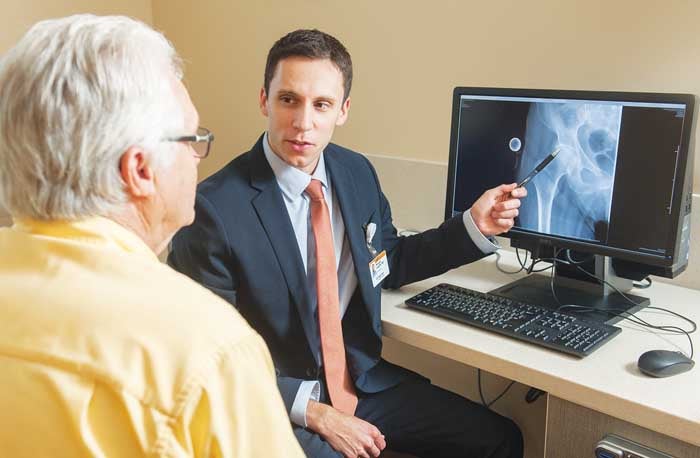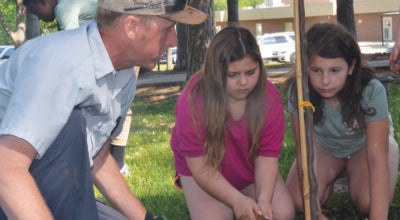Hospital expands to deal with growth in hip and knee surgeries
Published 9:41 am Thursday, November 12, 2015

- Dr. Max Langfitt explains an x-ray to a patient.
By Les Gura
Wake Forest
Baptist HealthWire
Growing up in Pittsburgh, Max Langfitt, M.D., played ice hockey and golf. While on the golf course, he noticed that some golfers were limited in what they could do because of old injuries or arthritis.
Inspired to go into medicine partly because “my mom, a nurse, was a good role model for me,’’ Langfitt found himself drawn to the world of orthopaedics. He liked the idea that he could help golfers and other patients get back to activities they enjoyed – without pain.
Langfitt is the newest member of the Orthopaedic Services team at Wake Forest Baptist Health – Davie Medical Center. He joins a practice that has grown quickly since Orthopaedic Services opened at the Bermuda Run campus in October 2013.
“We like to start with conservative treatments,’’ Langfitt said of knee and hip osteoarthritis. “We don’t like to start with surgery.’’
But depending on the length of time people have been experiencing problems and the degree of their pain, current minimally invasive surgical techniques in hip and knee replacement can have many patients bouncing back quickly, he said.
“It’s nice to hear when patients are able to resume activities they enjoy, like playing doubles tennis, swimming, golf, and light jogging – activities where arthritis might have been limiting them before,” Langfitt said.
The addition of a third fellowship-trained knee and hip specialist to the orthopaedic team at Davie Medical Center is one indication of a recent trend in health.
Projections show that knee surgeries in this country will increase 300 percent by the year 2030, and hip replacement surgeries will increase by 180 percent, said Jason Lang, M.D., an orthopaedic surgeon who also specializes in knee and hip replacements.
According to Lang, there are several reasons why more people are requiring hip and knee surgeries—whether full or partial replacements.
For one thing, he said, obesity rates are higher than ever before and that can lead to deterioration of joints in that population. On the flip side, more people are exercising even later in life and that, too, can result in injuries or wear and tear on joints.
“It’s really the aging boomer population,’’ Lang said.
Langfitt noted another factor behind the projected rise in knee and hip replacement surgeries—artificial hips and knees wear out, and the previous generation of those materials had a lifespan of 10 to 15 years. Langfitt, having completed his fellowship at New England Baptist Hospital in Boston in July, said modern technology allows new knee and hip replacement materials to last 15 to 20 years, or even longer.
The third hip and knee specialist with the team, John Shields, M.D., said he and Lang are pleased to have another physician to address the growing demand. Both men knew Langfitt during his five years as an orthopaedic surgery resident at Wake Forest Baptist Medical Center.
“I’ve seen Max grow from a resident to an attending physician,” Shields said. “For me, it’s been a very rewarding process. He comes at cases very differently than we do and challenges us to think differently and look critically at what we do. And vice versa.’’
All three physicians said they look forward to the completion of the 50-bed inpatient facility at Davie Medical Center. The facility will allow joint replacement surgeries to take place at the Bermuda Run campus, where patients are already seen for preoperative and postoperative visits.
“It will be great to have all our preoperative assessments, all of the specialized surgeries, the postoperative therapy and the protocols in one place to make sure people have the most smooth recovery possible,” Lang said. “It’s making Davie Medical Center the true care destination for hip and knee replacement.”





